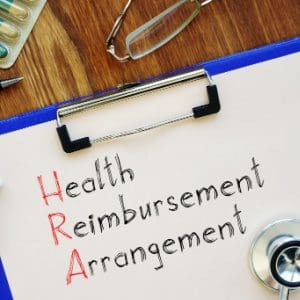
This guide answers frequently asked questions about Health Reimbursement Arrangements (HRA FAQs).
Part of consumer-driven healthcare, Health Reimbursement Arrangements (HRAs) are used by participants to pay out-of-pocket medical expenses. While HRAs have the same basic legal guidelines as other tax-advantaged reimbursement accounts, a major difference is that they are funded exclusively by the sponsoring employer, and funding levels and eligible expenses are unique to each employer. Refer to the HRA FAQs below for answers to some common questions about these accounts.
HRA FAQs
What is a Health Reimbursement Arrangement?
An HRA is an employer-owned and employer-funded benefit account. Plan participants and dependents use the account funds to pay for eligible medical expenses.
Who contributes to an HRA?
By law, HRAs can only be funded by the sponsoring employer. Participants are not allowed to contribute.
Are there annual contribution limits?
Since there are no government-imposed limits on a regular group HRA, any limit is determined by the employer as part of the plan setup.
When are funds deposited?
HRA funding decisions are made by the employer. An HRA may be funded monthly, quarterly, semi-annually, annually, in some other time frame, or even by the claim. The Summary Plan Description (SPD) will list those details.
What is an HRA-eligible expense?
Although determined during plan setup by the employer, qualified expenses still must comply with IRS medical expense regulations. Common HRA-reimbursable expenses include copays, deductibles, co-insurance, and prescriptions. Refer to the Summary Plan Document (SPD) for more information.
What is a Summary Plan Description?
Issued by the sponsoring employer, the SPD outlines all plan terms and conditions for participants and beneficiaries. The SPD provides details such as:
- Plan year begin and end dates
- Description of benefits/eligible expenses
- Funding amount
- Participant eligibility
- Claims procedures
- Plan and participant termination
- Associated COBRA, HIPAA, and other federal mandates
- Circumstances that would cause a loss of benefits
Which expenses are not eligible?
According to IRS Publication 502, these are some expenses that are ineligible for HRA reimbursement:
- Babysitting, childcare, and nursing services for a healthy baby
- Contributions to other tax-advantaged accounts (e.g., FSA, HSA)
- Controlled substances that are illegal under federal law
- Cosmetic surgeries and procedures not related to illness/disease or impairment of normal bodily function (i.e., teeth whitening, hair transplants, breast enlargement)
- Dancing lessons
- Diaper services
- Future medical care
- Health club dues
- Health coverage tax credit
- Household help
- Illegal operations and treatments
- Insurance premiums
- Maternity clothes
- Medicines and drugs from another country
- Personal use items (i.e., toothbrush)
- Premium tax credits
- Swimming lessons
- Veterinary fees
- Weight-loss programs
Can reimbursements come from multiple accounts?
Participants cannot claim the same expense twice, a practice known as “double dipping.” However, some situations may allow reimbursement from multiple accounts. For example, consider a participant with an HRA and FSA. That person incurs a $500 bill, but only $200 is available in the HRA, so they receive the $200. Thereafter, the participant may claim the remaining $300 against their FSA. Participants with an HRA and FSA (or HSA), should refer to their SPD to determine which account pays first.
When a participant leaves the company, who keeps their unused HRA balance?
Being employer-owned, HRA account funds stay with the company if a participant terminates employment. However, some employers have retirement HRAs or other provisions that permit the use of the funds for a specific time frame. Refer to the SPD for more information.
Can an HRA link to a debit card?
Some HRAs include benefits debit cards. Information about their use will also be found in the SPD.
Is an HRA health insurance?
Although HRAs are not health insurance, they are usually paired with an employer’s health insurance plan (see the SPD). Additionally, participants cannot pay health insurance premiums with regular HRA funds.
Who receives tax benefits from an HRA?
As the funding entity, the employer receives all HRA-related tax benefits. HRA reimbursements do not count as participant income.
Do HRA funds roll over?
Some plans may allow HRA rollover at the end of the plan year. Refer to the SPD.
For 40 years, DataPath has been a pivotal force in the employee benefits, financial services, and insurance industries. The company’s flagship DataPath Summit platform offers an integrated solution for managing CDH, HSA, Well-Being, COBRA, and Billing. Through its partnership with Accelergent Growth Solutions, DataPath also offers expert BPO services, automation, outsourced customer service, and award-winning marketing services.
